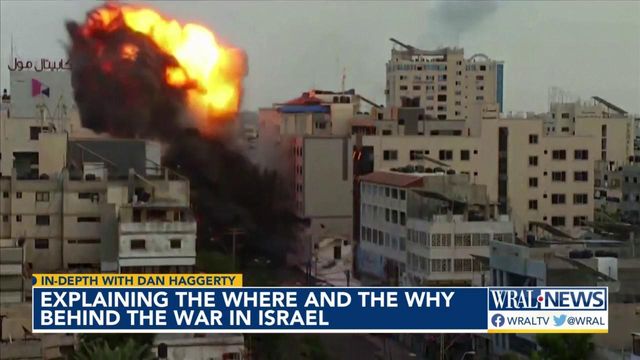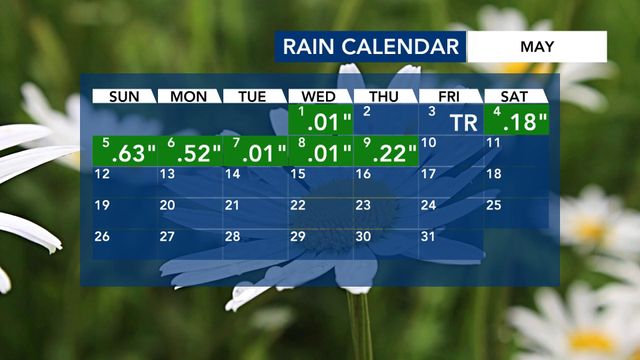In Depth with Dan explores the historic context of the Israeli-Palestinian conflict
Many journalists across the world have tried to break down the Hamas’ attack on Israel during the past several days.
The New York Times published a timeline on Saturday of the clashes between Palestinian militants and Israel. The article, like several others, starts in the late 1940s, when the nation of Israel was established.
After the Holocaust and World War II, a lot of Jewish people were displaced and felt unsafe, so the United Nations took a portion of Palestine and gave it to the Jews as a sovereign state. When that happened, the Palestinians who were forced out of that land -- and every surrounding Arab nation -- declared war.
However, the conflict between believers of three of the world’s largest religions dates to the birth of modern civilization.
The area that is now Israel is not only one of the most fought over pieces of Earth in modern history, it has been conquered and ruled by different empires for thousands of years, including the Egyptian Empire, the Babylonians, the Persians, Macedonians, Romans, the Byzantine, the Ottoman and the British – and now the home to Israel – which is a direct result of British occupation during World War I.
Israel is on land sacred to Jews, Muslims and Christians.
In Judaism, Jerusalem is their holiest site, including the Temple Mount where biblical holy temples stood thousands of years ago.
It’s a site that is also revered by Muslims. It’s where Muslims believe the prophet Muhammad ascended to heaven and talked to God before returning to earth.
For Christians, it’s the birthplace of their faith. Christians believe it’s where Jesus was crucified, buried and rose from the dead. The sites are also worshiped by Muslims, who believe Jesus was a prophet.
There are members of each religion who believe that this holy land is theirs and a place for their god to be worshiped, remembered and respected.
WRAL News spoke with Duke University Sanford School of Public Policy professor Bruce Jentleson to ask about the significance of religion in the conflict surrounding the region.
“If you look around the world, religion is the basis for lots of conflicts,” Jentleson said. “In India, right now between Hindus and Muslims.
“In Northern Ireland, it’s been Catholics against Protestants. It is a conflict in our own country. What you have here is the layering of so many elements. You have different religions, Islam and Judaism. You have a sense that both feel that they have long term, biblical or historical rights to the land because the land has been moved back and forth between so many different occupiers over the centuries, and you also have countries with their own politics.”
Jentleson said the dispute with Israel started in the late 1940s.
“I think we started in 1948-49 when the United Nations, one of the very first acts of the newly created United Nations, mandated two states, Israel and Palestine, with broad international support, the United States, Soviet Union and others,” Jentleson said.
That declaration wasn’t universally accepted for two reasons:
- “One is the armies of all the surrounding Arab countries refused to recognize there to be a state of Israel, and they declared war on Israel,” Jentleson said.
- “On Israel’s part, they conducted what the Palestinians and Arab called the Nakba, where they expelled and forced out of villages where Palestinians were supposed to stay within Israel and they expelled them out to (be) refugees,” Jentleson said.
The back-and-forth continues to this day.
In 1967, Israel won a war and seized the territories that are now the West Bank and Gaza. In 1993, there was a major effort in the peace process.
“Some progress was made, real hope,” Jentleson said. “Obviously, it didn’t happen.”
Jentleson said while there has been conflict in the last 10 years between Israel, Hamas and others, this is “profoundly different.”
“It's such of a different magnitude in so many respects that it's its own version of a really negative watershed,” Jentleson said.
Jentleson said there are two main Palestinian groups.
1. The West Bank on the eastern side of Israel is controlled by the Palestinian Authority.
“That was Yasser Arafat’s group, and Arafat was the one in 1993 that signed agreements to try to pursue peace with Israel,” Jentleson said. “They have their terrorist elements, but they basically recognize a two-state solution to Israel’s right to exist.”
2. Hamas, which controls the Gaza Strip over on the west side of Israel and by the Mediterranean Sea.
“[Hamas] is a fundamentally terrorist group that has been sworn to the destruction of Israel,” Jentleson said. “It's not about the terms of peace. It denies any peace at all.
“They won an election in the Gaza Strip in 2006. They haven't had an election since. And they've been the big driver.”
Jentleson mentioned another group called the Islamic Jihad that's also based in Gaza.
The Israel-Hamas war that began this week has already claimed more than 2,200 lives, including at least 22 U.S. citizens, with at least 17 more Americans unaccounted for.
WRAL News asked Jentleson how he predicts the Israel-Hamas conflict will unfold.
“For the Israelis, there's been a confidence, perhaps an overconfidence, that their military superiority and their intelligence capabilities would keep them secure no matter what happened,” Jentleson said. “This totally punctured that.
“No matter what happens in the next weeks and months, that will never be the same.”
Jentleson mentioned former Israeli Prime Minister Yitzhak Rabin, the commanding general in one of the country’s most successful wars.
“[He] always said, ‘There is no guarantee that peace will bring us security, but there is no way we will be secure without peace,” Jentleson said. “This is a real reminder of Rabin's wisdom, who sadly was assassinated by one of his own extremists back in 1995.”
In Depth With Dan
Dan Haggerty is a reporter and anchor for WRAL. He’s won four regional Emmy awards for his anchoring and reporting. He's reported in Fort Myers, Florida; Cleveland; San Diego; Dallas; Portland, Oregon and Raleigh, North Carolina. He is proud to call the Triangle home.
Anyone who has an idea for In Depth with Dan can email him at dan@wral.com.









